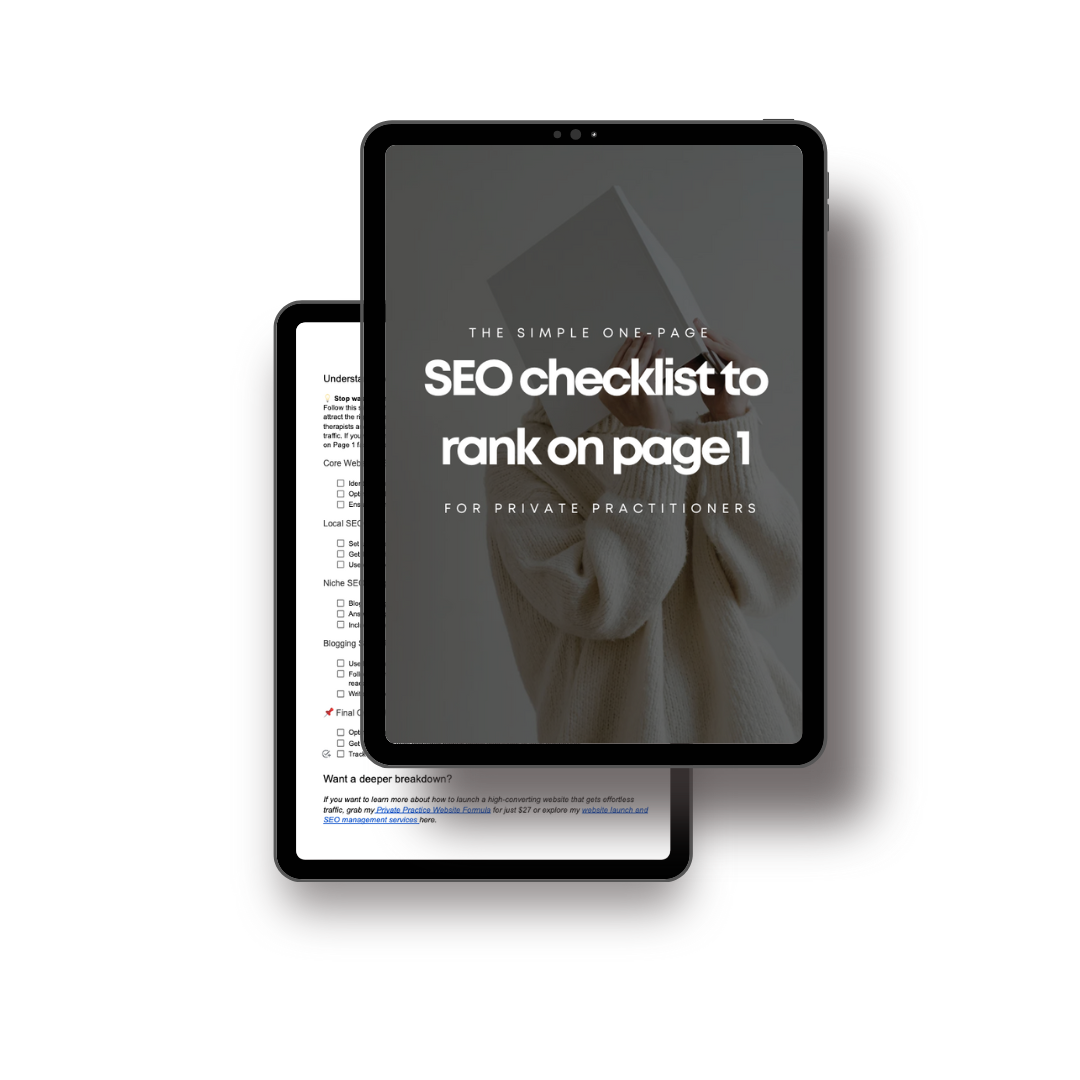How to pick a profitable therapy niche and get higher-paying clients
Are you feeling stuck trying to market your therapy practice to everyone, hoping to attract the right clients? Many therapists worry that choosing a niche will limit their opportunities, but the truth is, niching down is the key to standing out, attracting clients who value your expertise, and charging premium rates for your services.
In case we haven’t met, I’m Natalia Maganda, and I help ambitious therapists launch high-converting websites . Today, I’ll show you why choosing a profitable niche isn’t about limiting yourself—it’s about unlocking new levels of success and fulfillment in your practice.
Let’s dive into why niching down works, how to choose your perfect niche, and how to create a practice that attracts higher-paying clients.
Why niching down is important
How niching benefits your practice
Specializing in trauma or anxiety is already a powerful way to establish yourself as an expert, but narrowing down to a specific ideal client within that specialization can elevate your practice even further. While your trauma expertise might allow you to help anyone, focusing your messaging on a specific group—such as moms navigating parenthood while healing from trauma, or parents of teens struggling with anxiety—can create stronger connections and drive better results for your marketing efforts.
When you define your ideal client, your messaging becomes sharper and more targeted. For example, instead of broadly promoting trauma-informed care, you might focus on creating resources and content that speak directly to the unique challenges moms face, such as balancing self-care while managing family responsibilities. Similarly, if you specialize in anxiety support for teens, your marketing could emphasize helping parents understand and manage their child’s anxiety, positioning you as the go-to expert for that need.
This specificity not only helps you stand out but also builds trust with your audience. Clients want to feel seen and understood, and when your messaging speaks directly to their pain points, they’re more likely to choose you over a generalist—even one with the same qualifications. Niching down doesn’t limit your opportunities; it amplifies them by helping you attract the exact clients who need your expertise the most.
Overcoming the fear of repelling people
It’s natural to worry that focusing on a niche will turn people away. But the reality is, trying to appeal to everyone often results in appealing to no one. When you clearly define your ideal client within your specialty, you attract higher-quality clients who are aligned with your expertise and willing to invest in their growth.
Niching also makes it easier for referral sources to send the right clients your way. Instead of trying to “do it all,” you become the therapist people think of for a specific issue, like relationship struggles or anxiety management.
The ROI of specialization
Specializing allows you to charge higher rates because clients perceive niche experts as more valuable. Think about it: if you had a very specific problem, would you want to work with a generalist or someone who has deep experience solving that exact issue?
Therapists who focus on a niche often see higher client retention and satisfaction, leading to steady referrals and more opportunities for growth. Plus, with fewer but more aligned clients, you can avoid burnout while still hitting your income goals.
What type of therapy is most in demand?
Trends in the mental health field
The demand for therapy continues to grow, but certain niches stand out. For example:
- Trauma-Informed Care: With increased awareness of the effects of trauma, many clients are seeking therapists who specialize in this area. Source here
- Anxiety and Stress Management: These are evergreen needs, especially as more people face burnout and uncertainty. Read more about therapy statistics here.
- Couples and Family Counseling: Relationship challenges remain one of the top reasons people seek therapy.
There is also a bigger demand than mental health professionals and the lack of insurance makes it a barrier for some people to seek online therapy according to Helpguide.org
How to match demand with your passion
While demand is important, choosing a niche you’re passionate about is key to long-term success. Working in an area that energizes you, rather than drains you, prevents burnout and makes your work more rewarding. Consider what challenges you enjoy solving and the clients you feel most connected to helping.
Therapy niche quiz: Questions to define your dream clients
Understanding your ideal client
Choosing a niche begins with reflecting on the clients you enjoy working with and the challenges you’re best equipped to address. By asking targeted questions, you can uncover patterns in your practice and narrow your focus to a niche that aligns with your skills and passions. Here are specific questions to guide your thinking:
Who are your favorite clients, and what makes them stand out?
- Think about the sessions that leave you feeling energized or fulfilled.
- Are there specific client demographics (e.g., parents, young adults, veterans) that you find especially rewarding to work with?
- What common traits do your favorite clients share? (e.g., resilience, curiosity, openness to growth).
What challenges or issues do these clients bring to therapy?
- Do you enjoy helping clients overcome anxiety, navigate grief, or heal from trauma?
- Are there recurring themes in your sessions that you feel particularly skilled at addressing?
What type of transformation are you most passionate about facilitating?
- Do you love helping couples improve communication and rebuild trust?
- Are you passionate about guiding individuals through significant life transitions, such as divorce, career changes, or parenthood?
What personal or professional experiences shape your perspective?
- Have your own experiences with certain challenges, such as anxiety or trauma, given you a unique understanding that you bring to your work?
- Do you have advanced training or certifications in a specific area, such as CBT, mindfulness, or EMDR?
Who do you feel most confident and skilled working with?
- Are there client groups that you naturally connect with, such as teens, first-time parents, or LGBTQ+ individuals?
- What areas of therapy feel like second nature to you, where you can confidently guide clients toward growth?
What gaps in the market can you fill?
- Are there underserved populations in your area or niche that could benefit from your expertise?
- Is there a specific modality or approach you can offer that’s less common but highly effective?
By answering these questions, you’ll start to see patterns in your practice. For example, if you find that many of your favorite sessions involve helping parents navigate anxiety while raising children, your niche could be supporting moms and dads with stress management. If you’re passionate about working with young adults struggling to define their identity, focusing on this demographic can help you market more effectively.
Defining your ideal client isn’t about limiting yourself—it’s about positioning your expertise in a way that speaks directly to the people who need your help the most. By getting specific, you’ll create stronger connections with clients and build a practice that aligns with your passions and strengths.
Self-reflection for niching
Beyond client preferences, reflect on your professional and personal experiences. For example:
- Have you completed specialized training or certifications?
- Do you have a personal story that aligns with a specific client group, such as overcoming anxiety or navigating divorce?
This self-reflection can guide you toward a niche that feels authentic and aligned with your skills.
Niche validation
Once you’ve identified a potential niche, validate it by researching demand. Look at competitor websites, search Google trends, and check social media groups to see what potential clients are searching for and discussing. This step ensures your niche is not only fulfilling but also profitable.

The ultimate list of profitable therapy niches (and how to make six figures with them)
1. Anxiety and Stress Management
- Generalized Anxiety
- Social Anxiety
- Panic Disorder
- Burnout Prevention
2. Trauma and PTSD
- Childhood Trauma
- Complex PTSD (C-PTSD)
- Sexual Abuse Recovery
- First Responder Trauma
3. Grief and Loss
- Loss of a Loved One
- Miscarriage or Infant Loss
- Divorce Recovery
4. Relationships and Couples Therapy
- Premarital Counseling
- Infidelity Recovery
- Divorce Mediation Counseling
- Long-Distance Relationship Support
5. Family Therapy
- Parenting for Toddlers and Young Kids
- Supporting Teens Through Mental Health Struggles
- Blended Families Counseling
6. LGBTQ+ Affirming Therapy
- Coming Out Counseling
- Gender Identity Exploration
- Support for LGBTQ+ Couples
7. Neurodivergent Populations
- ADHD Management for Adults
- Autism Spectrum Support for Teens
- Executive Function Coaching
8. Teen and Young Adult Therapy
- Academic Pressure and Stress
- Navigating Identity and Self-Esteem
- College Transition Counseling
9. Life Transitions
- New Parenthood Adjustment
- Empty Nest Syndrome
- Retirement Transition Support
- Relocation and Expat Adjustment
10. Addiction and Recovery
- Alcohol Use Disorder Recovery
- Technology Addiction Counseling
- Support for Families of Addicts
11. Faith and Spiritual Counseling
- Faith-Based Therapy
- Navigating Spiritual Doubts or Transitions
- Rebuilding Faith After Trauma
12. Existential and Purpose-Focused Therapy
- Midlife Crisis Counseling
- Existential Anxiety Support
13. Therapy for Marginalized Communities
- Immigrant and Refugee Mental Health Support
- Coping with Racial Trauma
14. Therapy for Specific Professions
- Therapist Burnout Prevention
- Stress Management for Executives
- Support for Educators
15. Specialty Counseling for Health Concerns
- Coping with Chronic Illness
- Pain Management Therapy
- Sleep Disorder Counseling
16. Mindfulness and Holistic Therapies
- Mindfulness-Based Stress Reduction (MBSR)
- Yoga Therapy
- Art Therapy
Tips for making six figures in your niche
Success in a niche isn’t just about expertise—it’s about how you position and market your services.
1. Price your services strategically
Specializing allows you to charge premium rates because you're offering targeted expertise that clients highly value. Don't undervalue your work:
Reflect your value: Set your prices to mirror the depth of your specialization and the results you help clients achieve.
Communicate benefits: Clearly articulate the unique benefits and transformations clients can expect when working with you.
2. Diversify your income streams
Relying solely on one-on-one sessions can limit your earning potential. Consider expanding your offerings:
- Group therapy or workshops: Facilitate group sessions on topics relevant to your niche, allowing you to help more people simultaneously.
- Online courses or webinars: Develop digital products that clients can purchase and complete at their own pace.
- Membership programs: Create a subscription-based model providing ongoing support, resources, or exclusive content.
Why having a website is a must-have for standing out and converting private-pay clients
Your website as a client magnet
A website is more than an online placeholder—it’s the foundation of your marketing strategy. When optimized for your niche, it becomes a powerful tool for attracting the right clients. A generalist website can feel unfocused, but a niche-specific site shows potential clients that you truly understand their struggles.
Optimizing for conversions
Your website needs to guide visitors toward taking action. This means having clear calls-to-action, such as booking a consultation or signing up for a workshop. Highlight your niche expertise throughout the site to build trust and encourage clients to take the next step.
Using content to build trust
Blogging about niche-related topics can position you as a thought leader and improve your site’s SEO. When potential clients see your expertise and commitment to helping people like them, they’re more likely to reach out.
Choosing a profitable therapy niche is one of the most impactful decisions you can make for your practice.
By specializing, you’ll attract higher-paying clients, stand out in the market, and build a business that aligns with your passions and goals.
If you’re ready to take your niche to the next level with a website that truly works for you, let’s chat. I help therapists and coaches create niche-focused websites that attract their ideal clients and drive results. Explore my web design for therapists and launch a dream website that attracts your ideal clients effortlessly.
Related reads therapist marketing:
- How to make $100K as a therapist without seeing 20+ clients a week
- Private practice therapist salary and tips for increasing your income
- How much is Psychology today? Pros and cons
- 10 simple ways to get more therapy clients for your private practice
- How to write an engaging Psychology Today profile

* AI Disclosure: This content may contain sections generated with AI with the purpose of providing you with condensed helpful and relevant content, however all personal opinions are 100% human made as well as the blog post structure, outline and key takeaways.
* Affiliate Disclosure: Some of the links on www.nataliamaganda.com may contain affiliate links meaning that I will get a commission for recommending products at no extra cost to you.

hello! i'm natalia
Latina, web design expert for mental health professionals.
I help ambitious life coaches, therapists and holistic leaders amplify their magic, gain visibility, and simplify their marketing efforts through strategic web design and content.










